Business Ethics Report: Ethical Considerations and Objectives
VerifiedAdded on 2019/12/04
|11
|3014
|38
Report
AI Summary
This report delves into the realm of business ethics, examining various ethical perspectives such as deontological, teleological, and consequentiality theories, alongside the contrast between absolute and relative ethics. The report uses AstraZeneca as a case study to analyze how ethical considerations impact business objectives, including ensuring safety, raising sales and profitability, fostering a rewarding work environment, and increasing access to healthcare. It further explores the implications of these ethical considerations for AstraZeneca and its stakeholders, encompassing consumers (patients), employees, and the organization itself. The report highlights ethical issues affecting operational activities, such as environmental sustainability, access to healthcare, responsible research, corporate governance, discrimination, and deceptive marketing practices. Recommendations are provided to enhance ethical practices within the organization.

Business Ethics
Paraphrase This Document
Need a fresh take? Get an instant paraphrase of this document with our AI Paraphraser
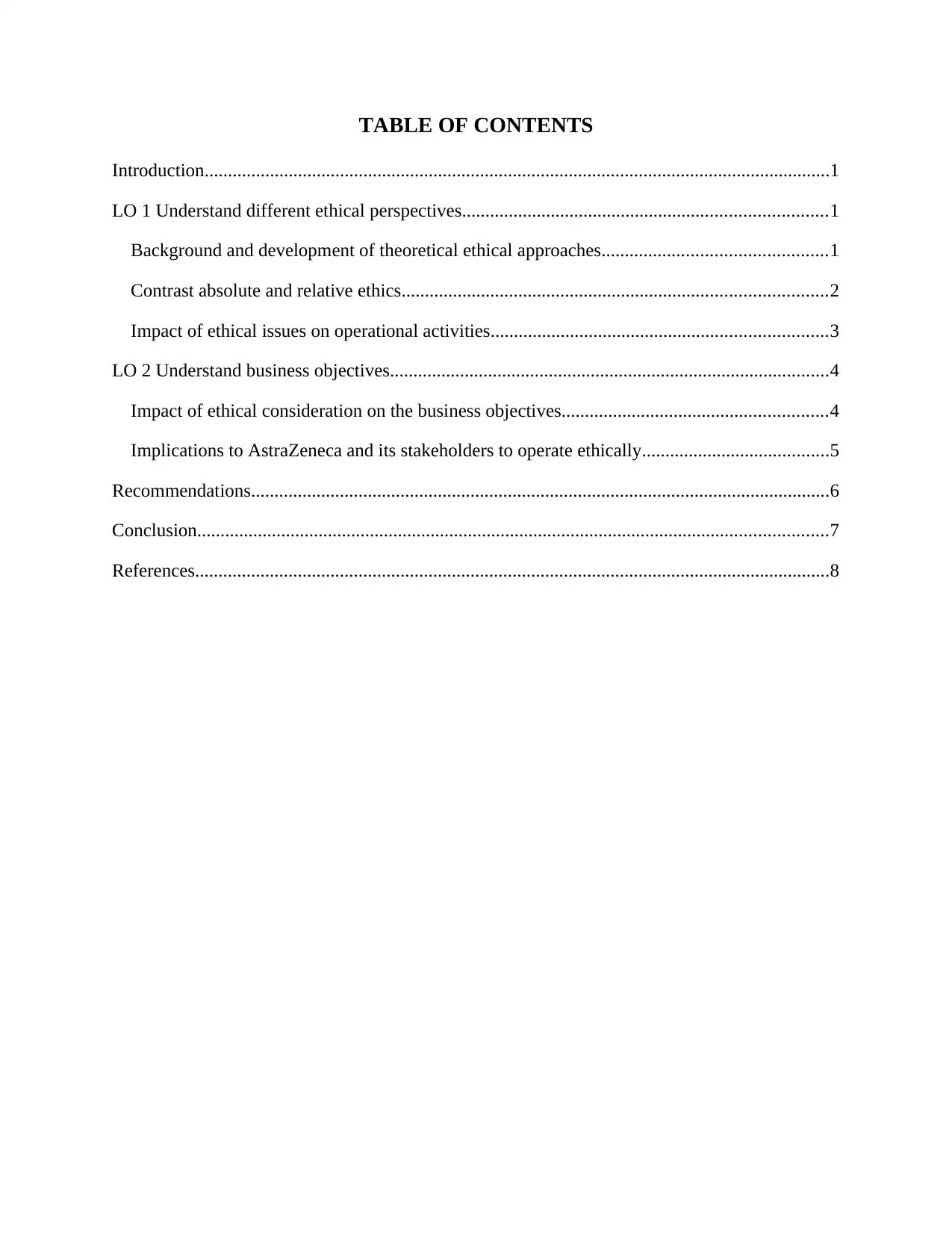
TABLE OF CONTENTS
Introduction......................................................................................................................................1
LO 1 Understand different ethical perspectives..............................................................................1
Background and development of theoretical ethical approaches................................................1
Contrast absolute and relative ethics...........................................................................................2
Impact of ethical issues on operational activities........................................................................3
LO 2 Understand business objectives..............................................................................................4
Impact of ethical consideration on the business objectives.........................................................4
Implications to AstraZeneca and its stakeholders to operate ethically........................................5
Recommendations............................................................................................................................6
Conclusion.......................................................................................................................................7
References........................................................................................................................................8
Introduction......................................................................................................................................1
LO 1 Understand different ethical perspectives..............................................................................1
Background and development of theoretical ethical approaches................................................1
Contrast absolute and relative ethics...........................................................................................2
Impact of ethical issues on operational activities........................................................................3
LO 2 Understand business objectives..............................................................................................4
Impact of ethical consideration on the business objectives.........................................................4
Implications to AstraZeneca and its stakeholders to operate ethically........................................5
Recommendations............................................................................................................................6
Conclusion.......................................................................................................................................7
References........................................................................................................................................8
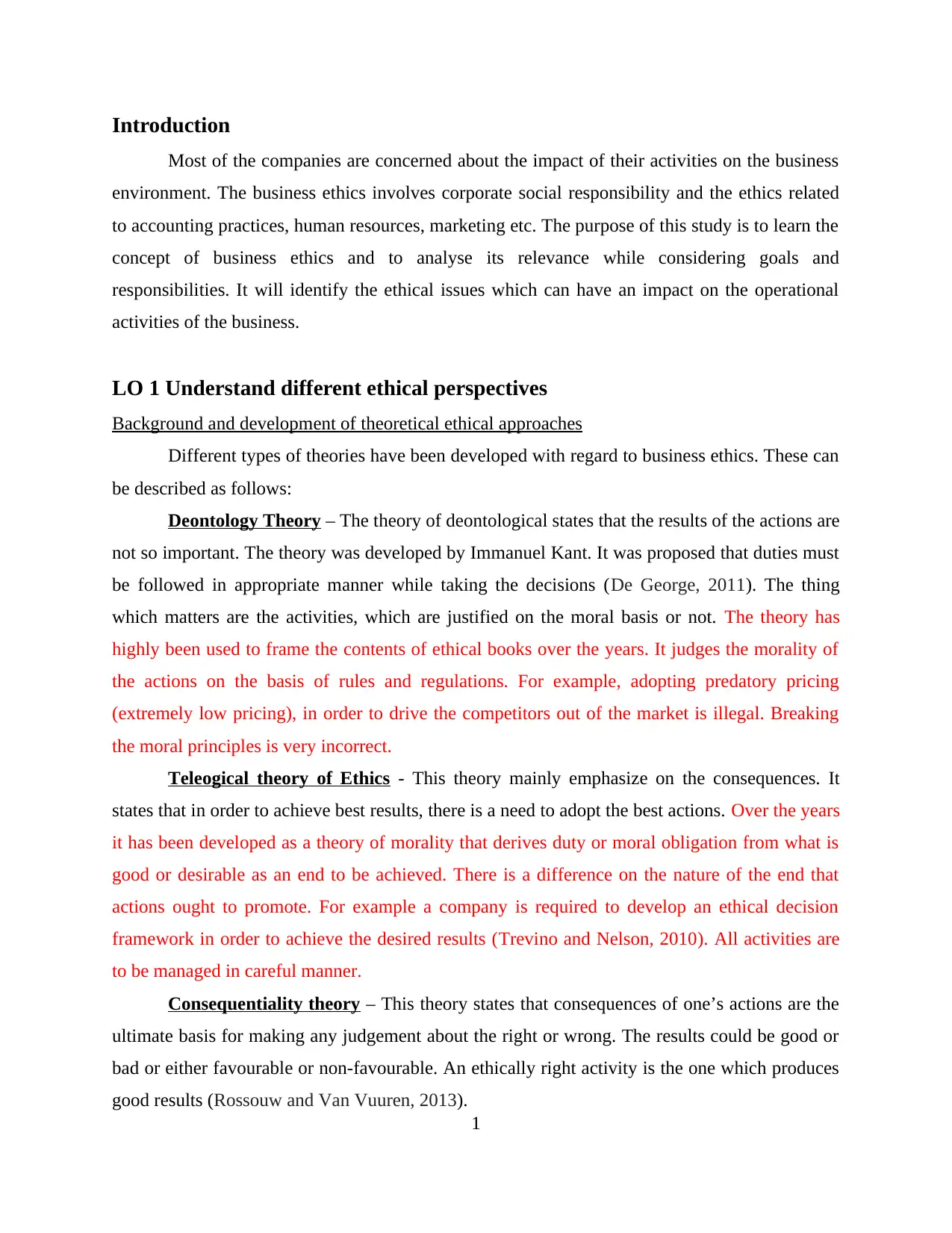
Introduction
Most of the companies are concerned about the impact of their activities on the business
environment. The business ethics involves corporate social responsibility and the ethics related
to accounting practices, human resources, marketing etc. The purpose of this study is to learn the
concept of business ethics and to analyse its relevance while considering goals and
responsibilities. It will identify the ethical issues which can have an impact on the operational
activities of the business.
LO 1 Understand different ethical perspectives
Background and development of theoretical ethical approaches
Different types of theories have been developed with regard to business ethics. These can
be described as follows:
Deontology Theory – The theory of deontological states that the results of the actions are
not so important. The theory was developed by Immanuel Kant. It was proposed that duties must
be followed in appropriate manner while taking the decisions (De George, 2011). The thing
which matters are the activities, which are justified on the moral basis or not. The theory has
highly been used to frame the contents of ethical books over the years. It judges the morality of
the actions on the basis of rules and regulations. For example, adopting predatory pricing
(extremely low pricing), in order to drive the competitors out of the market is illegal. Breaking
the moral principles is very incorrect.
Teleogical theory of Ethics - This theory mainly emphasize on the consequences. It
states that in order to achieve best results, there is a need to adopt the best actions. Over the years
it has been developed as a theory of morality that derives duty or moral obligation from what is
good or desirable as an end to be achieved. There is a difference on the nature of the end that
actions ought to promote. For example a company is required to develop an ethical decision
framework in order to achieve the desired results (Trevino and Nelson, 2010). All activities are
to be managed in careful manner.
Consequentiality theory – This theory states that consequences of one’s actions are the
ultimate basis for making any judgement about the right or wrong. The results could be good or
bad or either favourable or non-favourable. An ethically right activity is the one which produces
good results (Rossouw and Van Vuuren, 2013).
1
Most of the companies are concerned about the impact of their activities on the business
environment. The business ethics involves corporate social responsibility and the ethics related
to accounting practices, human resources, marketing etc. The purpose of this study is to learn the
concept of business ethics and to analyse its relevance while considering goals and
responsibilities. It will identify the ethical issues which can have an impact on the operational
activities of the business.
LO 1 Understand different ethical perspectives
Background and development of theoretical ethical approaches
Different types of theories have been developed with regard to business ethics. These can
be described as follows:
Deontology Theory – The theory of deontological states that the results of the actions are
not so important. The theory was developed by Immanuel Kant. It was proposed that duties must
be followed in appropriate manner while taking the decisions (De George, 2011). The thing
which matters are the activities, which are justified on the moral basis or not. The theory has
highly been used to frame the contents of ethical books over the years. It judges the morality of
the actions on the basis of rules and regulations. For example, adopting predatory pricing
(extremely low pricing), in order to drive the competitors out of the market is illegal. Breaking
the moral principles is very incorrect.
Teleogical theory of Ethics - This theory mainly emphasize on the consequences. It
states that in order to achieve best results, there is a need to adopt the best actions. Over the years
it has been developed as a theory of morality that derives duty or moral obligation from what is
good or desirable as an end to be achieved. There is a difference on the nature of the end that
actions ought to promote. For example a company is required to develop an ethical decision
framework in order to achieve the desired results (Trevino and Nelson, 2010). All activities are
to be managed in careful manner.
Consequentiality theory – This theory states that consequences of one’s actions are the
ultimate basis for making any judgement about the right or wrong. The results could be good or
bad or either favourable or non-favourable. An ethically right activity is the one which produces
good results (Rossouw and Van Vuuren, 2013).
1
⊘ This is a preview!⊘
Do you want full access?
Subscribe today to unlock all pages.

Trusted by 1+ million students worldwide
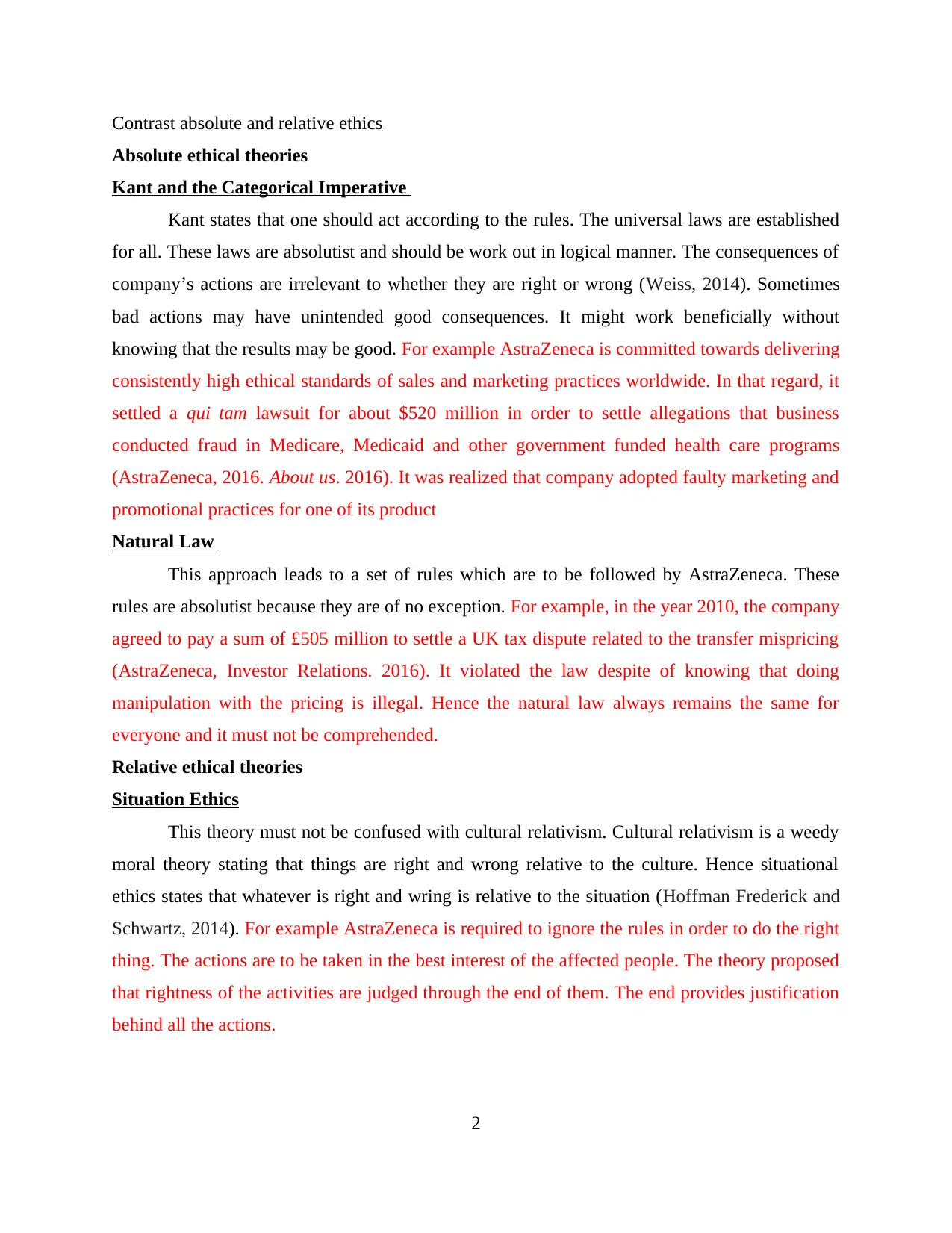
Contrast absolute and relative ethics
Absolute ethical theories
Kant and the Categorical Imperative
Kant states that one should act according to the rules. The universal laws are established
for all. These laws are absolutist and should be work out in logical manner. The consequences of
company’s actions are irrelevant to whether they are right or wrong (Weiss, 2014). Sometimes
bad actions may have unintended good consequences. It might work beneficially without
knowing that the results may be good. For example AstraZeneca is committed towards delivering
consistently high ethical standards of sales and marketing practices worldwide. In that regard, it
settled a qui tam lawsuit for about $520 million in order to settle allegations that business
conducted fraud in Medicare, Medicaid and other government funded health care programs
(AstraZeneca, 2016. About us. 2016). It was realized that company adopted faulty marketing and
promotional practices for one of its product
Natural Law
This approach leads to a set of rules which are to be followed by AstraZeneca. These
rules are absolutist because they are of no exception. For example, in the year 2010, the company
agreed to pay a sum of £505 million to settle a UK tax dispute related to the transfer mispricing
(AstraZeneca, Investor Relations. 2016). It violated the law despite of knowing that doing
manipulation with the pricing is illegal. Hence the natural law always remains the same for
everyone and it must not be comprehended.
Relative ethical theories
Situation Ethics
This theory must not be confused with cultural relativism. Cultural relativism is a weedy
moral theory stating that things are right and wrong relative to the culture. Hence situational
ethics states that whatever is right and wring is relative to the situation (Hoffman Frederick and
Schwartz, 2014). For example AstraZeneca is required to ignore the rules in order to do the right
thing. The actions are to be taken in the best interest of the affected people. The theory proposed
that rightness of the activities are judged through the end of them. The end provides justification
behind all the actions.
2
Absolute ethical theories
Kant and the Categorical Imperative
Kant states that one should act according to the rules. The universal laws are established
for all. These laws are absolutist and should be work out in logical manner. The consequences of
company’s actions are irrelevant to whether they are right or wrong (Weiss, 2014). Sometimes
bad actions may have unintended good consequences. It might work beneficially without
knowing that the results may be good. For example AstraZeneca is committed towards delivering
consistently high ethical standards of sales and marketing practices worldwide. In that regard, it
settled a qui tam lawsuit for about $520 million in order to settle allegations that business
conducted fraud in Medicare, Medicaid and other government funded health care programs
(AstraZeneca, 2016. About us. 2016). It was realized that company adopted faulty marketing and
promotional practices for one of its product
Natural Law
This approach leads to a set of rules which are to be followed by AstraZeneca. These
rules are absolutist because they are of no exception. For example, in the year 2010, the company
agreed to pay a sum of £505 million to settle a UK tax dispute related to the transfer mispricing
(AstraZeneca, Investor Relations. 2016). It violated the law despite of knowing that doing
manipulation with the pricing is illegal. Hence the natural law always remains the same for
everyone and it must not be comprehended.
Relative ethical theories
Situation Ethics
This theory must not be confused with cultural relativism. Cultural relativism is a weedy
moral theory stating that things are right and wrong relative to the culture. Hence situational
ethics states that whatever is right and wring is relative to the situation (Hoffman Frederick and
Schwartz, 2014). For example AstraZeneca is required to ignore the rules in order to do the right
thing. The actions are to be taken in the best interest of the affected people. The theory proposed
that rightness of the activities are judged through the end of them. The end provides justification
behind all the actions.
2
Paraphrase This Document
Need a fresh take? Get an instant paraphrase of this document with our AI Paraphraser
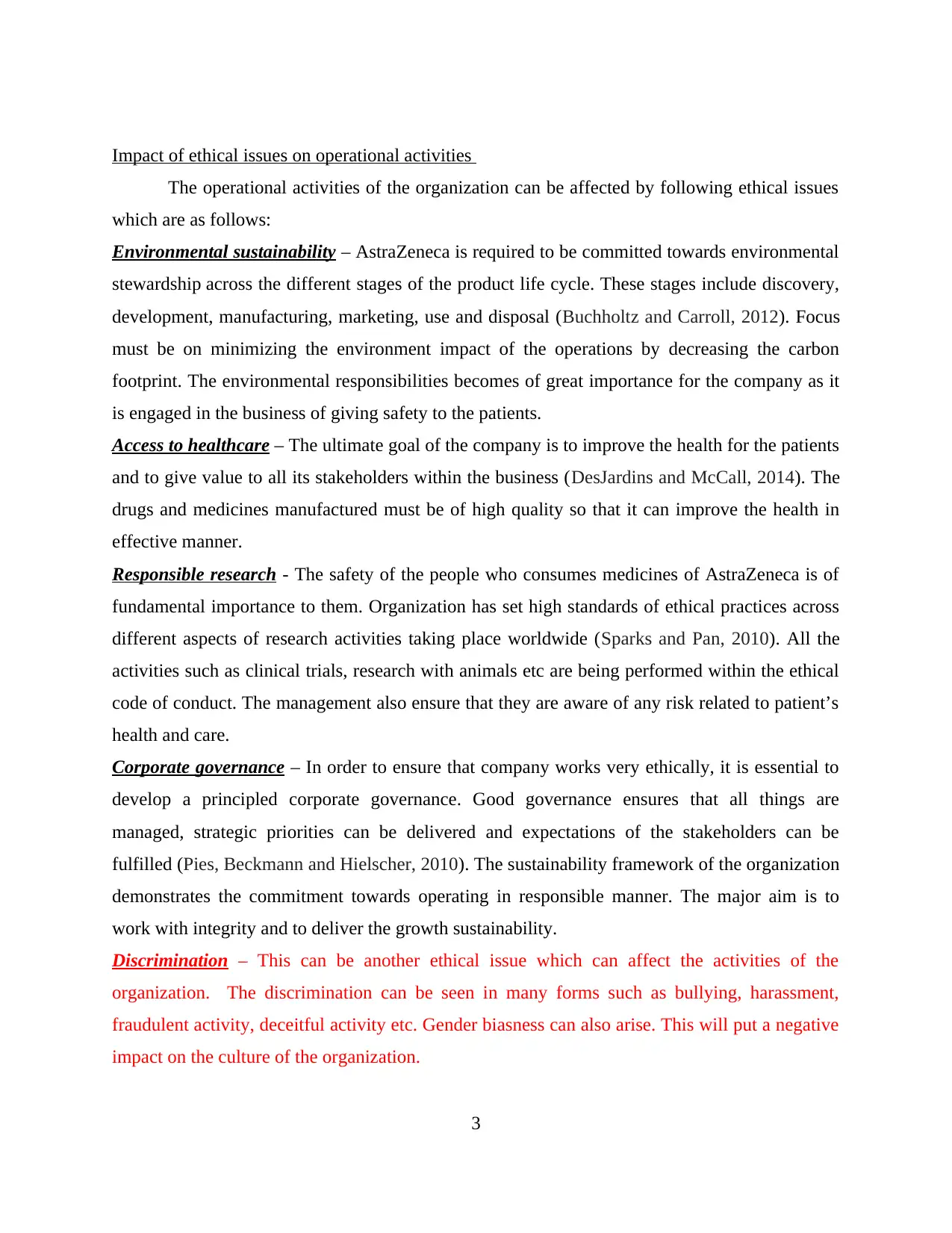
Impact of ethical issues on operational activities
The operational activities of the organization can be affected by following ethical issues
which are as follows:
Environmental sustainability – AstraZeneca is required to be committed towards environmental
stewardship across the different stages of the product life cycle. These stages include discovery,
development, manufacturing, marketing, use and disposal (Buchholtz and Carroll, 2012). Focus
must be on minimizing the environment impact of the operations by decreasing the carbon
footprint. The environmental responsibilities becomes of great importance for the company as it
is engaged in the business of giving safety to the patients.
Access to healthcare – The ultimate goal of the company is to improve the health for the patients
and to give value to all its stakeholders within the business (DesJardins and McCall, 2014). The
drugs and medicines manufactured must be of high quality so that it can improve the health in
effective manner.
Responsible research - The safety of the people who consumes medicines of AstraZeneca is of
fundamental importance to them. Organization has set high standards of ethical practices across
different aspects of research activities taking place worldwide (Sparks and Pan, 2010). All the
activities such as clinical trials, research with animals etc are being performed within the ethical
code of conduct. The management also ensure that they are aware of any risk related to patient’s
health and care.
Corporate governance – In order to ensure that company works very ethically, it is essential to
develop a principled corporate governance. Good governance ensures that all things are
managed, strategic priorities can be delivered and expectations of the stakeholders can be
fulfilled (Pies, Beckmann and Hielscher, 2010). The sustainability framework of the organization
demonstrates the commitment towards operating in responsible manner. The major aim is to
work with integrity and to deliver the growth sustainability.
Discrimination – This can be another ethical issue which can affect the activities of the
organization. The discrimination can be seen in many forms such as bullying, harassment,
fraudulent activity, deceitful activity etc. Gender biasness can also arise. This will put a negative
impact on the culture of the organization.
3
The operational activities of the organization can be affected by following ethical issues
which are as follows:
Environmental sustainability – AstraZeneca is required to be committed towards environmental
stewardship across the different stages of the product life cycle. These stages include discovery,
development, manufacturing, marketing, use and disposal (Buchholtz and Carroll, 2012). Focus
must be on minimizing the environment impact of the operations by decreasing the carbon
footprint. The environmental responsibilities becomes of great importance for the company as it
is engaged in the business of giving safety to the patients.
Access to healthcare – The ultimate goal of the company is to improve the health for the patients
and to give value to all its stakeholders within the business (DesJardins and McCall, 2014). The
drugs and medicines manufactured must be of high quality so that it can improve the health in
effective manner.
Responsible research - The safety of the people who consumes medicines of AstraZeneca is of
fundamental importance to them. Organization has set high standards of ethical practices across
different aspects of research activities taking place worldwide (Sparks and Pan, 2010). All the
activities such as clinical trials, research with animals etc are being performed within the ethical
code of conduct. The management also ensure that they are aware of any risk related to patient’s
health and care.
Corporate governance – In order to ensure that company works very ethically, it is essential to
develop a principled corporate governance. Good governance ensures that all things are
managed, strategic priorities can be delivered and expectations of the stakeholders can be
fulfilled (Pies, Beckmann and Hielscher, 2010). The sustainability framework of the organization
demonstrates the commitment towards operating in responsible manner. The major aim is to
work with integrity and to deliver the growth sustainability.
Discrimination – This can be another ethical issue which can affect the activities of the
organization. The discrimination can be seen in many forms such as bullying, harassment,
fraudulent activity, deceitful activity etc. Gender biasness can also arise. This will put a negative
impact on the culture of the organization.
3
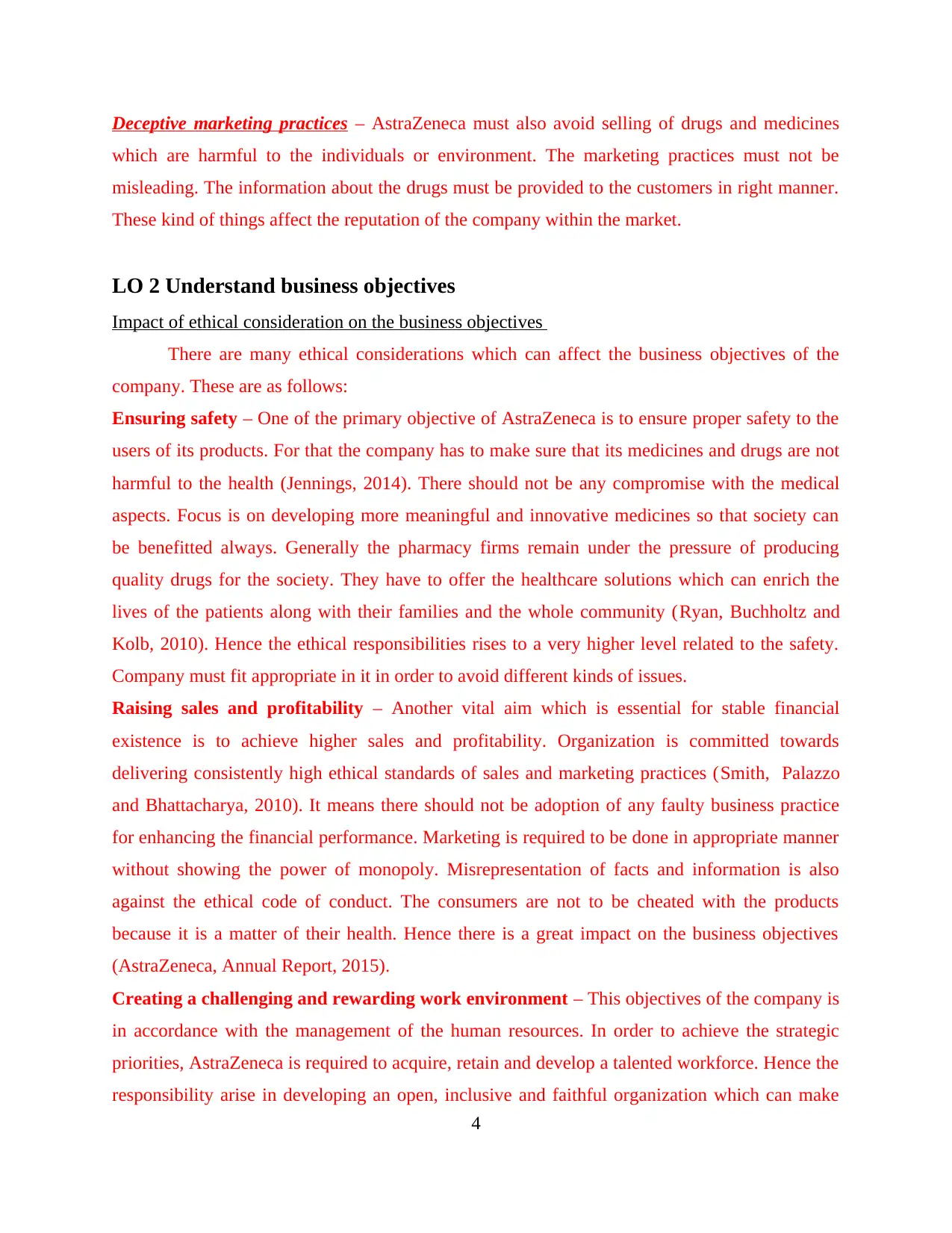
Deceptive marketing practices – AstraZeneca must also avoid selling of drugs and medicines
which are harmful to the individuals or environment. The marketing practices must not be
misleading. The information about the drugs must be provided to the customers in right manner.
These kind of things affect the reputation of the company within the market.
LO 2 Understand business objectives
Impact of ethical consideration on the business objectives
There are many ethical considerations which can affect the business objectives of the
company. These are as follows:
Ensuring safety – One of the primary objective of AstraZeneca is to ensure proper safety to the
users of its products. For that the company has to make sure that its medicines and drugs are not
harmful to the health (Jennings, 2014). There should not be any compromise with the medical
aspects. Focus is on developing more meaningful and innovative medicines so that society can
be benefitted always. Generally the pharmacy firms remain under the pressure of producing
quality drugs for the society. They have to offer the healthcare solutions which can enrich the
lives of the patients along with their families and the whole community (Ryan, Buchholtz and
Kolb, 2010). Hence the ethical responsibilities rises to a very higher level related to the safety.
Company must fit appropriate in it in order to avoid different kinds of issues.
Raising sales and profitability – Another vital aim which is essential for stable financial
existence is to achieve higher sales and profitability. Organization is committed towards
delivering consistently high ethical standards of sales and marketing practices (Smith, Palazzo
and Bhattacharya, 2010). It means there should not be adoption of any faulty business practice
for enhancing the financial performance. Marketing is required to be done in appropriate manner
without showing the power of monopoly. Misrepresentation of facts and information is also
against the ethical code of conduct. The consumers are not to be cheated with the products
because it is a matter of their health. Hence there is a great impact on the business objectives
(AstraZeneca, Annual Report, 2015).
Creating a challenging and rewarding work environment – This objectives of the company is
in accordance with the management of the human resources. In order to achieve the strategic
priorities, AstraZeneca is required to acquire, retain and develop a talented workforce. Hence the
responsibility arise in developing an open, inclusive and faithful organization which can make
4
which are harmful to the individuals or environment. The marketing practices must not be
misleading. The information about the drugs must be provided to the customers in right manner.
These kind of things affect the reputation of the company within the market.
LO 2 Understand business objectives
Impact of ethical consideration on the business objectives
There are many ethical considerations which can affect the business objectives of the
company. These are as follows:
Ensuring safety – One of the primary objective of AstraZeneca is to ensure proper safety to the
users of its products. For that the company has to make sure that its medicines and drugs are not
harmful to the health (Jennings, 2014). There should not be any compromise with the medical
aspects. Focus is on developing more meaningful and innovative medicines so that society can
be benefitted always. Generally the pharmacy firms remain under the pressure of producing
quality drugs for the society. They have to offer the healthcare solutions which can enrich the
lives of the patients along with their families and the whole community (Ryan, Buchholtz and
Kolb, 2010). Hence the ethical responsibilities rises to a very higher level related to the safety.
Company must fit appropriate in it in order to avoid different kinds of issues.
Raising sales and profitability – Another vital aim which is essential for stable financial
existence is to achieve higher sales and profitability. Organization is committed towards
delivering consistently high ethical standards of sales and marketing practices (Smith, Palazzo
and Bhattacharya, 2010). It means there should not be adoption of any faulty business practice
for enhancing the financial performance. Marketing is required to be done in appropriate manner
without showing the power of monopoly. Misrepresentation of facts and information is also
against the ethical code of conduct. The consumers are not to be cheated with the products
because it is a matter of their health. Hence there is a great impact on the business objectives
(AstraZeneca, Annual Report, 2015).
Creating a challenging and rewarding work environment – This objectives of the company is
in accordance with the management of the human resources. In order to achieve the strategic
priorities, AstraZeneca is required to acquire, retain and develop a talented workforce. Hence the
responsibility arise in developing an open, inclusive and faithful organization which can make
4
⊘ This is a preview!⊘
Do you want full access?
Subscribe today to unlock all pages.

Trusted by 1+ million students worldwide
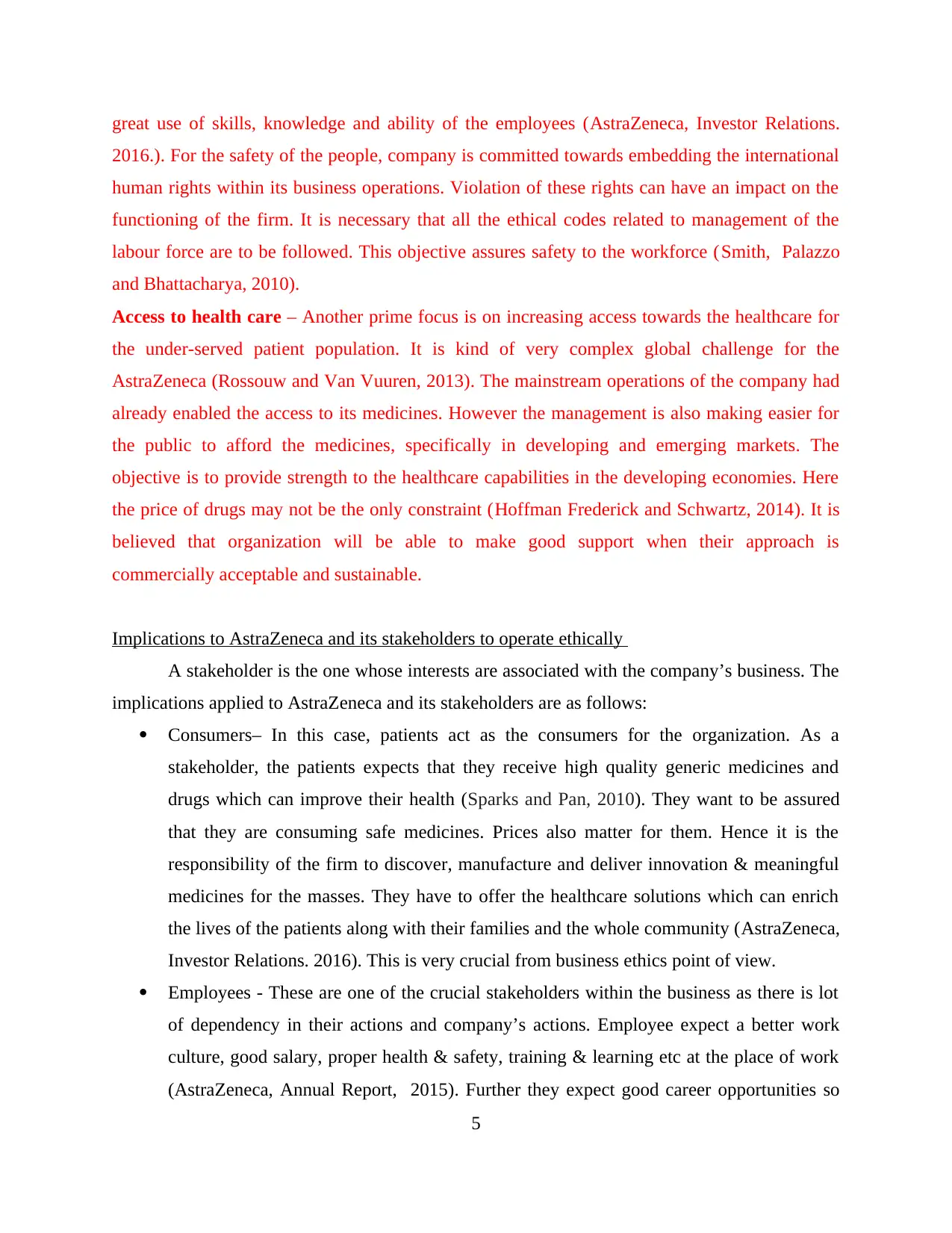
great use of skills, knowledge and ability of the employees (AstraZeneca, Investor Relations.
2016.). For the safety of the people, company is committed towards embedding the international
human rights within its business operations. Violation of these rights can have an impact on the
functioning of the firm. It is necessary that all the ethical codes related to management of the
labour force are to be followed. This objective assures safety to the workforce (Smith, Palazzo
and Bhattacharya, 2010).
Access to health care – Another prime focus is on increasing access towards the healthcare for
the under-served patient population. It is kind of very complex global challenge for the
AstraZeneca (Rossouw and Van Vuuren, 2013). The mainstream operations of the company had
already enabled the access to its medicines. However the management is also making easier for
the public to afford the medicines, specifically in developing and emerging markets. The
objective is to provide strength to the healthcare capabilities in the developing economies. Here
the price of drugs may not be the only constraint (Hoffman Frederick and Schwartz, 2014). It is
believed that organization will be able to make good support when their approach is
commercially acceptable and sustainable.
Implications to AstraZeneca and its stakeholders to operate ethically
A stakeholder is the one whose interests are associated with the company’s business. The
implications applied to AstraZeneca and its stakeholders are as follows:
Consumers– In this case, patients act as the consumers for the organization. As a
stakeholder, the patients expects that they receive high quality generic medicines and
drugs which can improve their health (Sparks and Pan, 2010). They want to be assured
that they are consuming safe medicines. Prices also matter for them. Hence it is the
responsibility of the firm to discover, manufacture and deliver innovation & meaningful
medicines for the masses. They have to offer the healthcare solutions which can enrich
the lives of the patients along with their families and the whole community (AstraZeneca,
Investor Relations. 2016). This is very crucial from business ethics point of view.
Employees - These are one of the crucial stakeholders within the business as there is lot
of dependency in their actions and company’s actions. Employee expect a better work
culture, good salary, proper health & safety, training & learning etc at the place of work
(AstraZeneca, Annual Report, 2015). Further they expect good career opportunities so
5
2016.). For the safety of the people, company is committed towards embedding the international
human rights within its business operations. Violation of these rights can have an impact on the
functioning of the firm. It is necessary that all the ethical codes related to management of the
labour force are to be followed. This objective assures safety to the workforce (Smith, Palazzo
and Bhattacharya, 2010).
Access to health care – Another prime focus is on increasing access towards the healthcare for
the under-served patient population. It is kind of very complex global challenge for the
AstraZeneca (Rossouw and Van Vuuren, 2013). The mainstream operations of the company had
already enabled the access to its medicines. However the management is also making easier for
the public to afford the medicines, specifically in developing and emerging markets. The
objective is to provide strength to the healthcare capabilities in the developing economies. Here
the price of drugs may not be the only constraint (Hoffman Frederick and Schwartz, 2014). It is
believed that organization will be able to make good support when their approach is
commercially acceptable and sustainable.
Implications to AstraZeneca and its stakeholders to operate ethically
A stakeholder is the one whose interests are associated with the company’s business. The
implications applied to AstraZeneca and its stakeholders are as follows:
Consumers– In this case, patients act as the consumers for the organization. As a
stakeholder, the patients expects that they receive high quality generic medicines and
drugs which can improve their health (Sparks and Pan, 2010). They want to be assured
that they are consuming safe medicines. Prices also matter for them. Hence it is the
responsibility of the firm to discover, manufacture and deliver innovation & meaningful
medicines for the masses. They have to offer the healthcare solutions which can enrich
the lives of the patients along with their families and the whole community (AstraZeneca,
Investor Relations. 2016). This is very crucial from business ethics point of view.
Employees - These are one of the crucial stakeholders within the business as there is lot
of dependency in their actions and company’s actions. Employee expect a better work
culture, good salary, proper health & safety, training & learning etc at the place of work
(AstraZeneca, Annual Report, 2015). Further they expect good career opportunities so
5
Paraphrase This Document
Need a fresh take? Get an instant paraphrase of this document with our AI Paraphraser
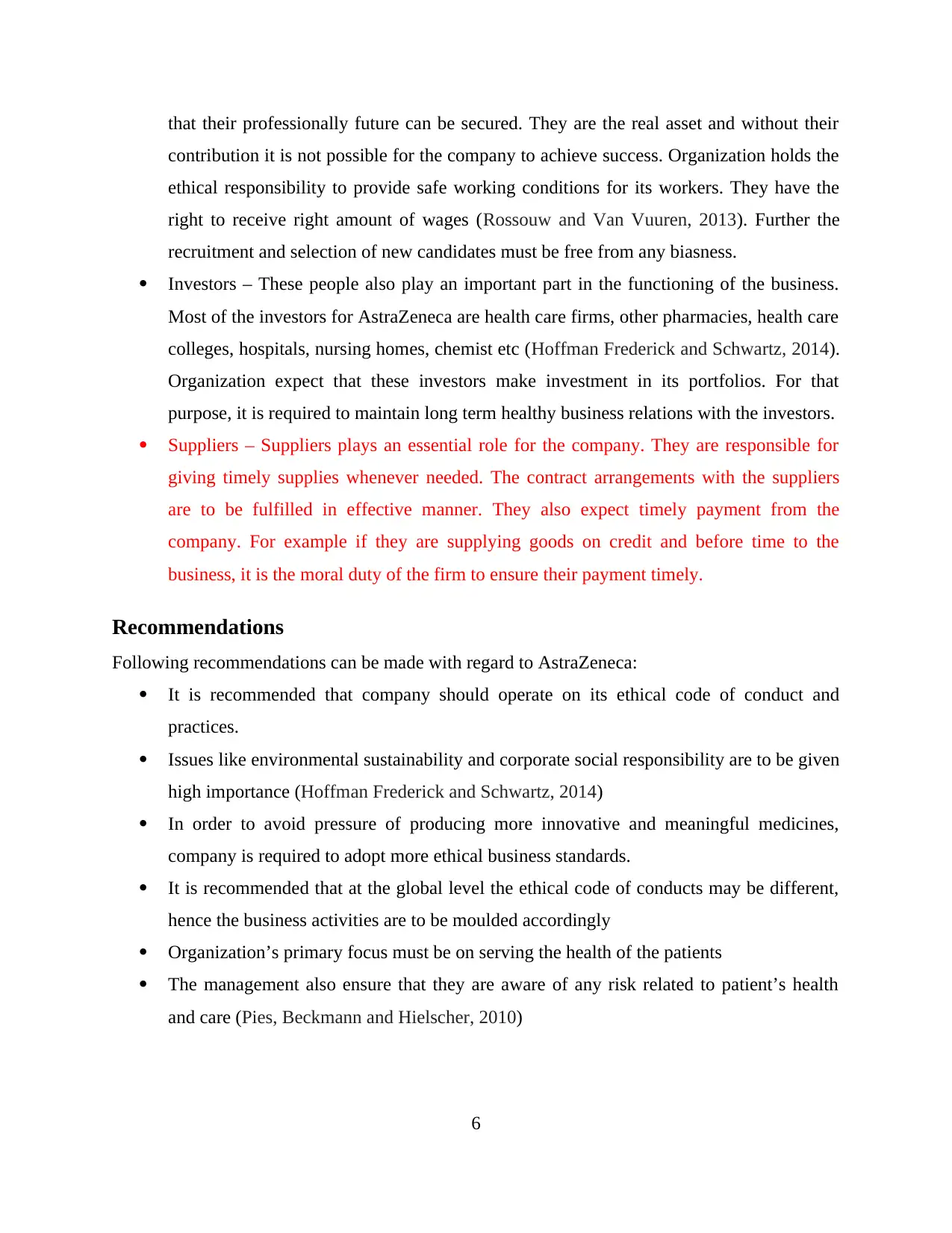
that their professionally future can be secured. They are the real asset and without their
contribution it is not possible for the company to achieve success. Organization holds the
ethical responsibility to provide safe working conditions for its workers. They have the
right to receive right amount of wages (Rossouw and Van Vuuren, 2013). Further the
recruitment and selection of new candidates must be free from any biasness.
Investors – These people also play an important part in the functioning of the business.
Most of the investors for AstraZeneca are health care firms, other pharmacies, health care
colleges, hospitals, nursing homes, chemist etc (Hoffman Frederick and Schwartz, 2014).
Organization expect that these investors make investment in its portfolios. For that
purpose, it is required to maintain long term healthy business relations with the investors.
Suppliers – Suppliers plays an essential role for the company. They are responsible for
giving timely supplies whenever needed. The contract arrangements with the suppliers
are to be fulfilled in effective manner. They also expect timely payment from the
company. For example if they are supplying goods on credit and before time to the
business, it is the moral duty of the firm to ensure their payment timely.
Recommendations
Following recommendations can be made with regard to AstraZeneca:
It is recommended that company should operate on its ethical code of conduct and
practices.
Issues like environmental sustainability and corporate social responsibility are to be given
high importance (Hoffman Frederick and Schwartz, 2014)
In order to avoid pressure of producing more innovative and meaningful medicines,
company is required to adopt more ethical business standards.
It is recommended that at the global level the ethical code of conducts may be different,
hence the business activities are to be moulded accordingly
Organization’s primary focus must be on serving the health of the patients
The management also ensure that they are aware of any risk related to patient’s health
and care (Pies, Beckmann and Hielscher, 2010)
6
contribution it is not possible for the company to achieve success. Organization holds the
ethical responsibility to provide safe working conditions for its workers. They have the
right to receive right amount of wages (Rossouw and Van Vuuren, 2013). Further the
recruitment and selection of new candidates must be free from any biasness.
Investors – These people also play an important part in the functioning of the business.
Most of the investors for AstraZeneca are health care firms, other pharmacies, health care
colleges, hospitals, nursing homes, chemist etc (Hoffman Frederick and Schwartz, 2014).
Organization expect that these investors make investment in its portfolios. For that
purpose, it is required to maintain long term healthy business relations with the investors.
Suppliers – Suppliers plays an essential role for the company. They are responsible for
giving timely supplies whenever needed. The contract arrangements with the suppliers
are to be fulfilled in effective manner. They also expect timely payment from the
company. For example if they are supplying goods on credit and before time to the
business, it is the moral duty of the firm to ensure their payment timely.
Recommendations
Following recommendations can be made with regard to AstraZeneca:
It is recommended that company should operate on its ethical code of conduct and
practices.
Issues like environmental sustainability and corporate social responsibility are to be given
high importance (Hoffman Frederick and Schwartz, 2014)
In order to avoid pressure of producing more innovative and meaningful medicines,
company is required to adopt more ethical business standards.
It is recommended that at the global level the ethical code of conducts may be different,
hence the business activities are to be moulded accordingly
Organization’s primary focus must be on serving the health of the patients
The management also ensure that they are aware of any risk related to patient’s health
and care (Pies, Beckmann and Hielscher, 2010)
6
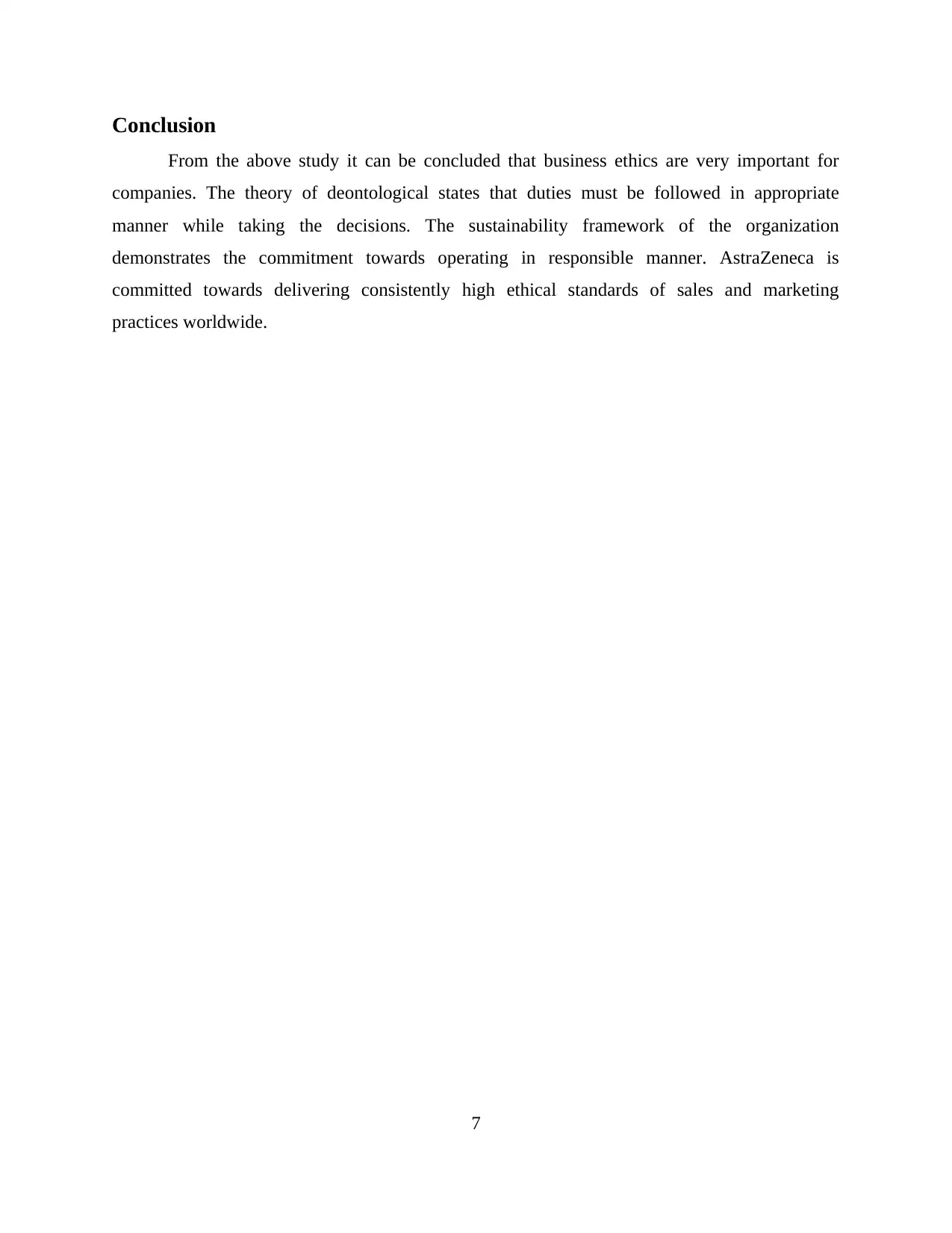
Conclusion
From the above study it can be concluded that business ethics are very important for
companies. The theory of deontological states that duties must be followed in appropriate
manner while taking the decisions. The sustainability framework of the organization
demonstrates the commitment towards operating in responsible manner. AstraZeneca is
committed towards delivering consistently high ethical standards of sales and marketing
practices worldwide.
7
From the above study it can be concluded that business ethics are very important for
companies. The theory of deontological states that duties must be followed in appropriate
manner while taking the decisions. The sustainability framework of the organization
demonstrates the commitment towards operating in responsible manner. AstraZeneca is
committed towards delivering consistently high ethical standards of sales and marketing
practices worldwide.
7
⊘ This is a preview!⊘
Do you want full access?
Subscribe today to unlock all pages.

Trusted by 1+ million students worldwide
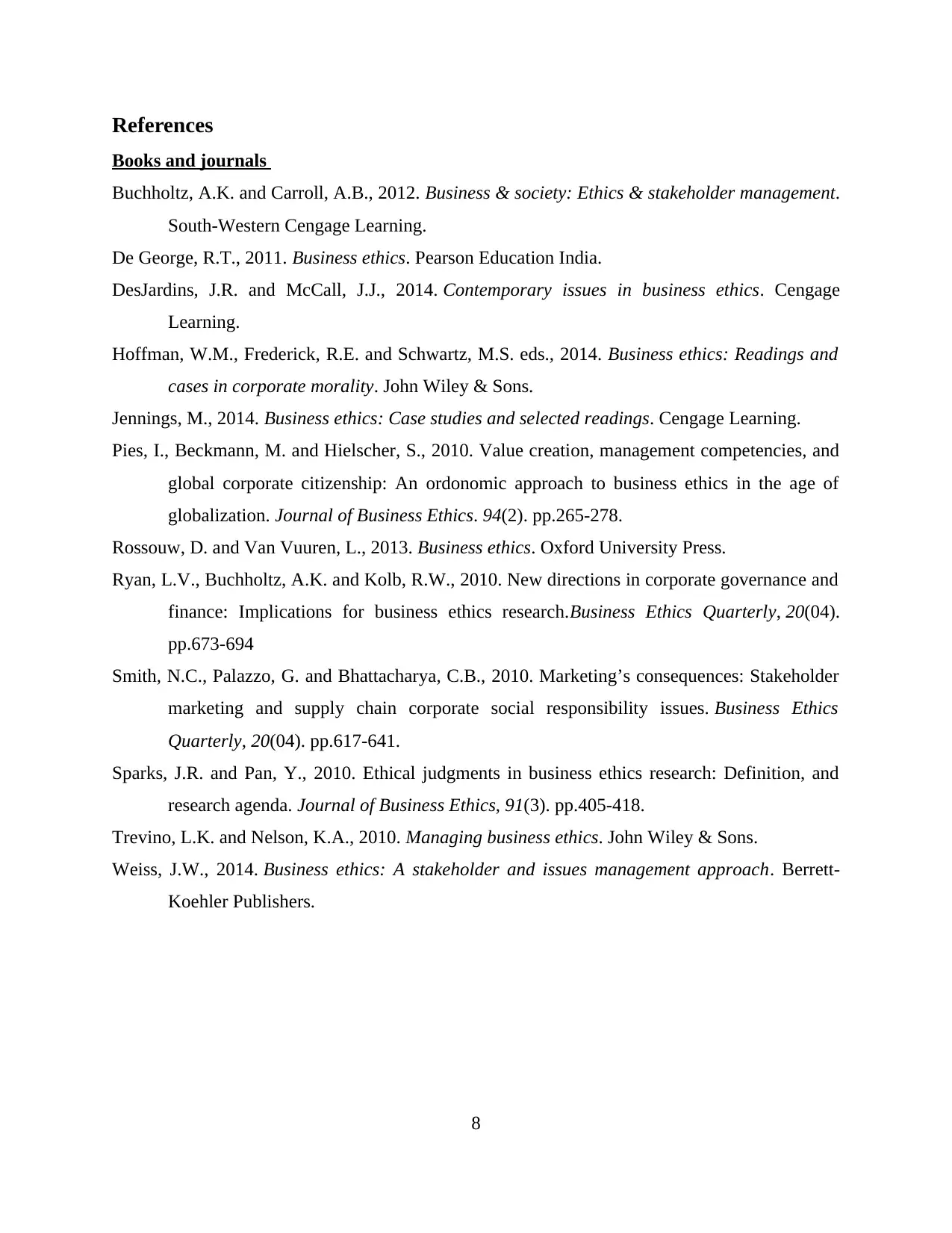
References
Books and journals
Buchholtz, A.K. and Carroll, A.B., 2012. Business & society: Ethics & stakeholder management.
South-Western Cengage Learning.
De George, R.T., 2011. Business ethics. Pearson Education India.
DesJardins, J.R. and McCall, J.J., 2014. Contemporary issues in business ethics. Cengage
Learning.
Hoffman, W.M., Frederick, R.E. and Schwartz, M.S. eds., 2014. Business ethics: Readings and
cases in corporate morality. John Wiley & Sons.
Jennings, M., 2014. Business ethics: Case studies and selected readings. Cengage Learning.
Pies, I., Beckmann, M. and Hielscher, S., 2010. Value creation, management competencies, and
global corporate citizenship: An ordonomic approach to business ethics in the age of
globalization. Journal of Business Ethics. 94(2). pp.265-278.
Rossouw, D. and Van Vuuren, L., 2013. Business ethics. Oxford University Press.
Ryan, L.V., Buchholtz, A.K. and Kolb, R.W., 2010. New directions in corporate governance and
finance: Implications for business ethics research.Business Ethics Quarterly, 20(04).
pp.673-694
Smith, N.C., Palazzo, G. and Bhattacharya, C.B., 2010. Marketing’s consequences: Stakeholder
marketing and supply chain corporate social responsibility issues. Business Ethics
Quarterly, 20(04). pp.617-641.
Sparks, J.R. and Pan, Y., 2010. Ethical judgments in business ethics research: Definition, and
research agenda. Journal of Business Ethics, 91(3). pp.405-418.
Trevino, L.K. and Nelson, K.A., 2010. Managing business ethics. John Wiley & Sons.
Weiss, J.W., 2014. Business ethics: A stakeholder and issues management approach. Berrett-
Koehler Publishers.
8
Books and journals
Buchholtz, A.K. and Carroll, A.B., 2012. Business & society: Ethics & stakeholder management.
South-Western Cengage Learning.
De George, R.T., 2011. Business ethics. Pearson Education India.
DesJardins, J.R. and McCall, J.J., 2014. Contemporary issues in business ethics. Cengage
Learning.
Hoffman, W.M., Frederick, R.E. and Schwartz, M.S. eds., 2014. Business ethics: Readings and
cases in corporate morality. John Wiley & Sons.
Jennings, M., 2014. Business ethics: Case studies and selected readings. Cengage Learning.
Pies, I., Beckmann, M. and Hielscher, S., 2010. Value creation, management competencies, and
global corporate citizenship: An ordonomic approach to business ethics in the age of
globalization. Journal of Business Ethics. 94(2). pp.265-278.
Rossouw, D. and Van Vuuren, L., 2013. Business ethics. Oxford University Press.
Ryan, L.V., Buchholtz, A.K. and Kolb, R.W., 2010. New directions in corporate governance and
finance: Implications for business ethics research.Business Ethics Quarterly, 20(04).
pp.673-694
Smith, N.C., Palazzo, G. and Bhattacharya, C.B., 2010. Marketing’s consequences: Stakeholder
marketing and supply chain corporate social responsibility issues. Business Ethics
Quarterly, 20(04). pp.617-641.
Sparks, J.R. and Pan, Y., 2010. Ethical judgments in business ethics research: Definition, and
research agenda. Journal of Business Ethics, 91(3). pp.405-418.
Trevino, L.K. and Nelson, K.A., 2010. Managing business ethics. John Wiley & Sons.
Weiss, J.W., 2014. Business ethics: A stakeholder and issues management approach. Berrett-
Koehler Publishers.
8
Paraphrase This Document
Need a fresh take? Get an instant paraphrase of this document with our AI Paraphraser
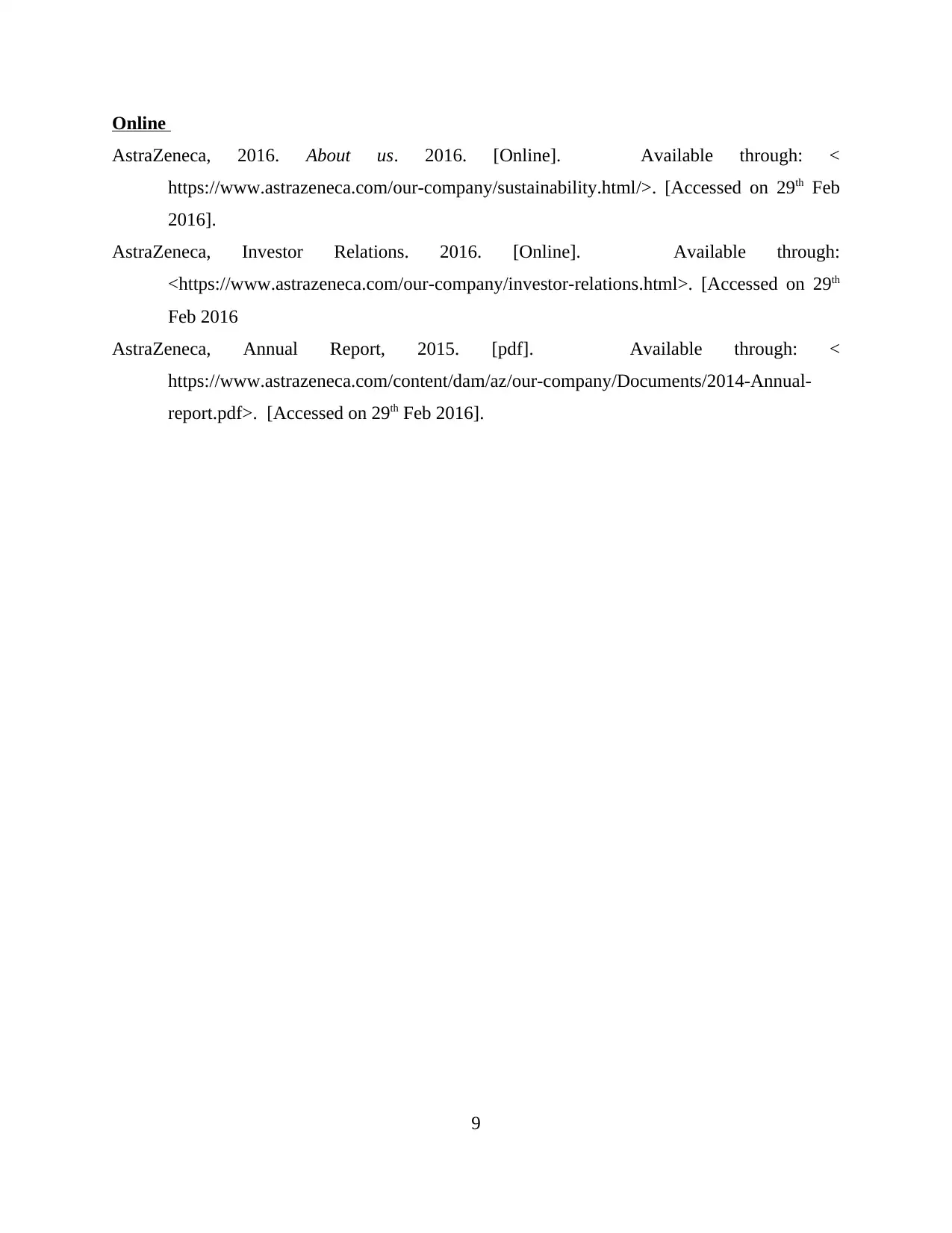
Online
AstraZeneca, 2016. About us. 2016. [Online]. Available through: <
https://www.astrazeneca.com/our-company/sustainability.html/>. [Accessed on 29th Feb
2016].
AstraZeneca, Investor Relations. 2016. [Online]. Available through:
<https://www.astrazeneca.com/our-company/investor-relations.html>. [Accessed on 29th
Feb 2016
AstraZeneca, Annual Report, 2015. [pdf]. Available through: <
https://www.astrazeneca.com/content/dam/az/our-company/Documents/2014-Annual-
report.pdf>. [Accessed on 29th Feb 2016].
9
AstraZeneca, 2016. About us. 2016. [Online]. Available through: <
https://www.astrazeneca.com/our-company/sustainability.html/>. [Accessed on 29th Feb
2016].
AstraZeneca, Investor Relations. 2016. [Online]. Available through:
<https://www.astrazeneca.com/our-company/investor-relations.html>. [Accessed on 29th
Feb 2016
AstraZeneca, Annual Report, 2015. [pdf]. Available through: <
https://www.astrazeneca.com/content/dam/az/our-company/Documents/2014-Annual-
report.pdf>. [Accessed on 29th Feb 2016].
9
1 out of 11
Related Documents
Your All-in-One AI-Powered Toolkit for Academic Success.
+13062052269
info@desklib.com
Available 24*7 on WhatsApp / Email
![[object Object]](/_next/static/media/star-bottom.7253800d.svg)
Unlock your academic potential
Copyright © 2020–2026 A2Z Services. All Rights Reserved. Developed and managed by ZUCOL.





